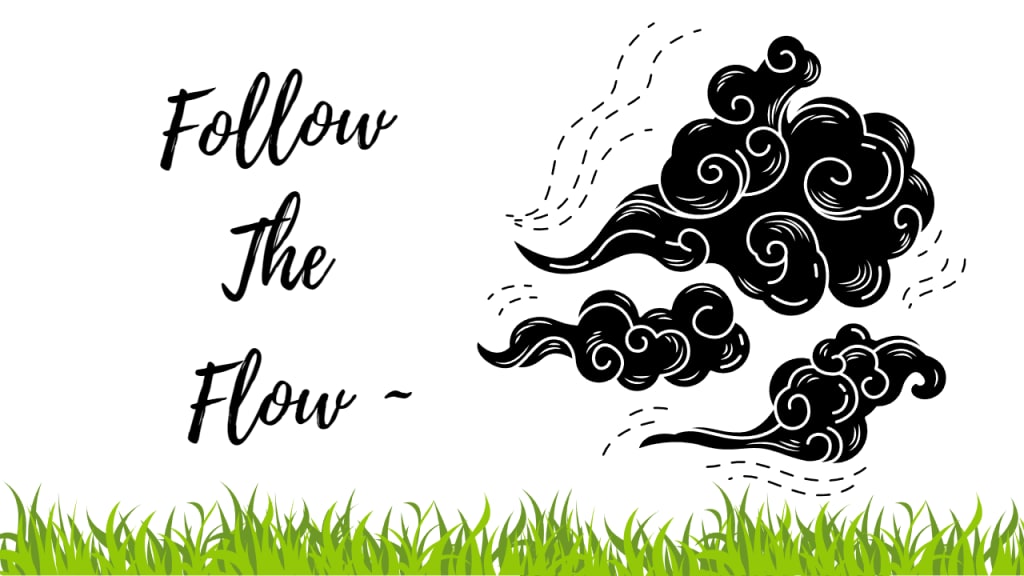
How follow the flow helps in life?
Following the flow means being present in the moment and allowing things to unfold naturally without trying to control or force the outcome. Here are some ways following the flow can help in life:
- Reducing stress and anxiety: When we try to control every aspect of our lives, we can become overwhelmed and anxious. Following the flow allows us to let go of control and trust that everything will work out in the end, reducing stress and anxiety.
- Improving decision-making: When we follow the flow, we are more in tune with our intuition and inner wisdom, which can help us make better decisions that align with our values and goals.
- Increasing creativity: When we let go of control and allow things to unfold naturally, we open ourselves up to new experiences and ideas that can spark creativity.
- Enhancing relationships: Following the flow means being present in the moment and fully engaging with the people around us, which can improve our relationships and deepen our connections with others.
- Cultivating gratitude: When we appreciate the present moment and trust that everything will work out, we can cultivate a sense of gratitude for all the good in our lives.
Overall, following the flow can help us live a more fulfilling and meaningful life by reducing stress, improving decision-making, increasing creativity, enhancing relationships, and cultivating gratitude.
How follow the flow is good for salespeople?
Following the flow can be beneficial for salespeople in several ways:
- Building rapport with clients: When salespeople follow the flow, they are present and attentive to the client's needs and concerns. This allows them to build rapport and trust with the client, which is crucial for successful sales.
- Improving listening skills: When salespeople follow the flow, they are focused on listening to the client's needs and concerns. This can help them to understand the client's pain points and tailor their sales pitch accordingly.
- Being flexible and adaptable: Following the flow requires being flexible and adaptable to the situation at hand. Salespeople who are able to adjust their approach based on the client's needs are more likely to be successful in closing the sale.
- Enhancing creativity: When salespeople let go of preconceived ideas about the client or the sale, they can become more creative in their approach. This can lead to new ideas and strategies that may be more effective in closing the sale.
- Reducing stress and pressure: When salespeople follow the flow, they are not overly attached to the outcome of the sale. This can reduce the stress and pressure that often comes with sales, allowing salespeople to perform better and be more relaxed and confident.
Overall, following the flow can help salespeople to build rapport with clients, improve their listening skills, be flexible and adaptable, enhance their creativity, and reduce stress and pressure. These benefits can ultimately lead to more successful sales and a more fulfilling career.
Who quoted follow the flow?
The phrase "follow the flow" has been used in various contexts by different people, and it is difficult to pinpoint a single originator or source of the quote. However, the concept of "following the flow" is a common theme in Taoism and is often associated with the Tao Te Ching, an ancient Chinese text attributed to the philosopher Lao Tzu. In the Tao Te Ching, the concept of "wu wei" is often translated as "effortless action" or "non-action", which can be seen as a form of following the flow or allowing things to happen naturally without force or resistance.
Who created ''follow the flow?''
It's difficult to attribute the creation of the phrase "follow the flow" to any specific person or individual. The concept of "following the flow" is a general idea that has been expressed in various forms by different people throughout history. The phrase has been used in different contexts, such as in philosophy, psychology, and spirituality, and it is difficult to trace its exact origin. It is possible that the phrase emerged as a way to describe the benefits of letting go and allowing things to unfold naturally, rather than trying to control or force outcomes.
When to ''follow the flow'' ?
Following the flow can be applied in many different situations and areas of life. Here are some examples of when it might be helpful to follow the flow:
- During Conversations: Following the flow can be helpful during conversations with others, particularly when trying to build rapport and deepen connections. By staying present and engaged with the other person, and being open to their ideas and perspectives, we can create a more fluid and enjoyable conversation.
- When Making Decisions: Following the flow can also be useful when making decisions, particularly when we feel stuck or unsure of what to do. By tuning into our intuition and being open to new ideas and possibilities, we can allow the decision-making process to unfold more naturally and with less stress.
- During Creative Endeavors: Following the flow can be particularly beneficial during creative endeavors, such as writing, painting, or playing music. By letting go of the need to control every aspect of the creative process, we can allow our creativity to flow more freely and organically.
- In Nature: Following the flow can also be helpful when spending time in nature, such as hiking or camping. By tuning into the natural rhythms and cycles of the environment, we can connect more deeply with the world around us and feel a greater sense of peace and harmony.
Overall, following the flow can be applied in many different situations and areas of life, and can help us to reduce stress, build connections, and deepen our understanding of the world. It involves being present, open, and flexible, and allowing things to unfold naturally and organically.
How ''follow the flow'' involve listening?
"Follow the flow" is a phrase that often refers to the act of going with the natural rhythm or movement of something, rather than trying to resist or fight against it. When it comes to listening, "following the flow" can mean being fully present and engaged with the person or thing that you are listening to, and allowing yourself to be carried along by the conversation or information being shared.
In order to "follow the flow" when listening, you need to be actively attentive to what the other person is saying, rather than just waiting for your turn to speak or thinking about your own opinions and ideas. This means being open to new perspectives and ideas, and letting go of preconceived notions or biases that might hinder your ability to truly understand and connect with the speaker.
Additionally, "following the flow" can involve paying attention to the nonverbal cues and signals that accompany communication, such as body language, tone of voice, and facial expressions. By tuning in to these subtle indicators, you can gain a deeper understanding of the speaker's emotions and intentions, which can help you to respond more effectively and empathetically.
Overall, "following the flow" when listening involves being fully present, attentive, and responsive to the person or thing you are engaging with, in order to build stronger connections and deepen your understanding.
How ''follow the flow'' reduces stress?
Following the flow can help to reduce stress in a number of ways when applied to different areas of life. Here are some ways in which it can help:
Reducing Overthinking: When we overthink or overanalyze a situation, it can lead to stress and anxiety. By following the flow and allowing things to unfold naturally, we can let go of the need to control everything and reduce our tendency to overthink. This can help to reduce stress and promote a sense of calm.
Promoting Mindfulness: Following the flow can involve being fully present in the moment and paying attention to what is happening right now. This promotes mindfulness, which has been shown to reduce stress and anxiety by helping people stay grounded and centered.
Encouraging Flexibility: Following the flow requires a certain level of flexibility and adaptability, as we need to be open to new ideas and ways of doing things. By practicing this flexibility, we can reduce the stress that comes from rigid thinking and resistance to change.
Reducing Conflict: When we try to force our own agenda or ideas onto others, it can lead to conflict and stress. By following the flow and being open to different perspectives, we can reduce the likelihood of conflict and promote more harmonious relationships.
Overall, following the flow can help to reduce stress by promoting mindfulness, flexibility, and harmony in our interactions with others and the world around us. By being more present and adaptable, we can let go of the need to control everything and find a greater sense of peace and ease.
Up Next- Discover How To Become Whole Mentally/ Physically & Spiritually.
About the Creator
Gino
Welcome dear






Comments
There are no comments for this story
Be the first to respond and start the conversation.